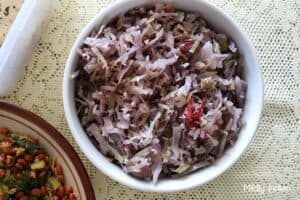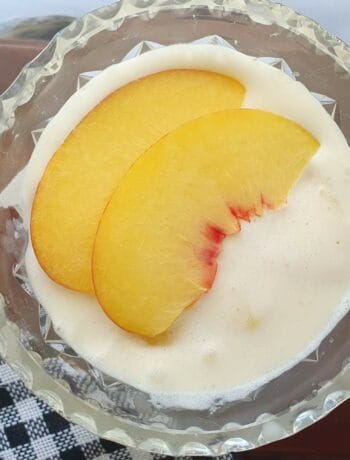Most of the sadhya or banana leaf meal carried a cabbage thoran is one of the dry stir-fried vegetable sidedishes. May it be on a thali or the sadhya, the most common thoran is the cabbage one. Now cabbage is not a native vegetable to Kerala. So I always wonder, how this got incorporated into a banana leaf meal?
No doubt the combination of stir-fried coconut with the chillies, shallots and coconut masala are tasty.
Here are my observations on why cabbage thoran is so popular
Unlike the cheera thoran which is practically an everyday sidewise, cleaning large amounts of cabbages is relatively simpler (compared to cleaning young jackfruit for thoran!!)
Though leafy green cabbage can stay fresh much longer than native grown leaves.
The volume of cabbage thoran, when compared to the amount you get from chopping up other vegetables (say yard beans thoran), is considerably high.
So, I put together that the ease of cooking, storing, shredding etc makes cabbage a popular choice.
How to make the cabbage thoran?
Here are the basic steps andd some fantastic pointers we gathered that helps to make one of the best cabbage thoran.

Selecting the cabbage
The first step of a great cabbage thoran is to select a good cabbage. The cabbage we are looking for is green or red(not savoury or napa). A dense feel of the cabbage is usually a good idea. The fresh, crisp outer leaves and no cracks or blemishes is an ideal sign to select a good cabbage. This time we have chosen a variegated cabbage with purple veins and green leaves.
Shredding the cabbage
The finely chopped cabbage is cooked evenly and the thoran tastes best with it.
There are a few different ways to achieve this. You can use a grater or a food processor with a larger shredding side. My dad used to prefer using the knife on a whole head of cabbage in a criss-cross pattern, commonly called” kothiarinja cabbage”. My hack is to shred it with a mandolin and then run a knife through it.
Prepping the coconut masala.
The fragrance and the flavour for the otherwise bland cabbage leaves come from two steps, the tapering with the shallots and the chillies and at last the addition of the pounded coconut cumin masala. The juicy freshly grated (or frozen) coconut add a tasty sweetness and a touch of oil to this cabbage thoran
Cooking the cabbage.
As most cooks will advise you, overboiled cabbage is a no-no. For this thoran, stirfry the cabbage for a few minutes and cover and cook without adding any water. The cabbage steams well and cooks evenly through this process. A further softness is added with the milk of the coconut making this thoran very tasty. Follow this recipe card for the detailed ingredient list and the quantity of ingredients needed.
Cabbage thoran
Ingredients
- 3 cups Cabbage shredded or grated
- salt to taste
for the coconut masala
- 1 medium green chilli choose to deseed to reduce the heat or use lesser.
- 5-7 curry leaves
- 1/2 tsp cumin seeds
- 1/2 cup grated coconut
for the tempering
- 1 tbsp coconut oil
- 1/2 tsp mustard seeds
- 1 large shallot
- 8-10 curry leaves
- 1 medium green chilli
Instructions
- Wash and pat dry the cabbage.
- Shred and run the knife to get an even chop of the cabbage, approximately 3 cups.
- Set it aside till needed
- Into the mortar and pestle add the coconut, cumin, curry leaves and green chilli ( deseeded if you like less heat) and pound till you get a coarse mix. Save it till needed.
- Heat a frying pan, add the oil add the mustard seeds and let them crackle.
- Clean a shallot and crush it slightly.
- Once the mustard crackles add the shallot, cumin and the green chilli.
- Once the shallot turns golden it infuses the flavour into the oil, add the cabbage.
- Stir fry the cabbage for a minute or two.
- Sprinkle salt and cover and cook for 3-4 minutes.
- Stir fry again, cover and cook for another few minutes.
- Now add the coconut masala and further stirfry further till they are all incorporated well.
- Taste test for salt and balance of spices. Adjust if needed.
- Remove into a serving dish and serve warm.

The best accompaniment to have cabbage thoran as a simple meal is with soft-cooked matta rice or payaru kanji. With sambhar and papadam to go with it, the meal is complete and filling.
Stay on with us by subscribing to our site. Please leave your thoughts and comments in the discussion below. If you have tried out this recipe, do let us know the adaptations you made. Check out the tips and tricks to a great sadhya – here or that essential South Indian meal you can serve to celebrate the upcoming Indian festival season. We would love to hear from you in our discussions.
Stay safe and keep visiting us.




